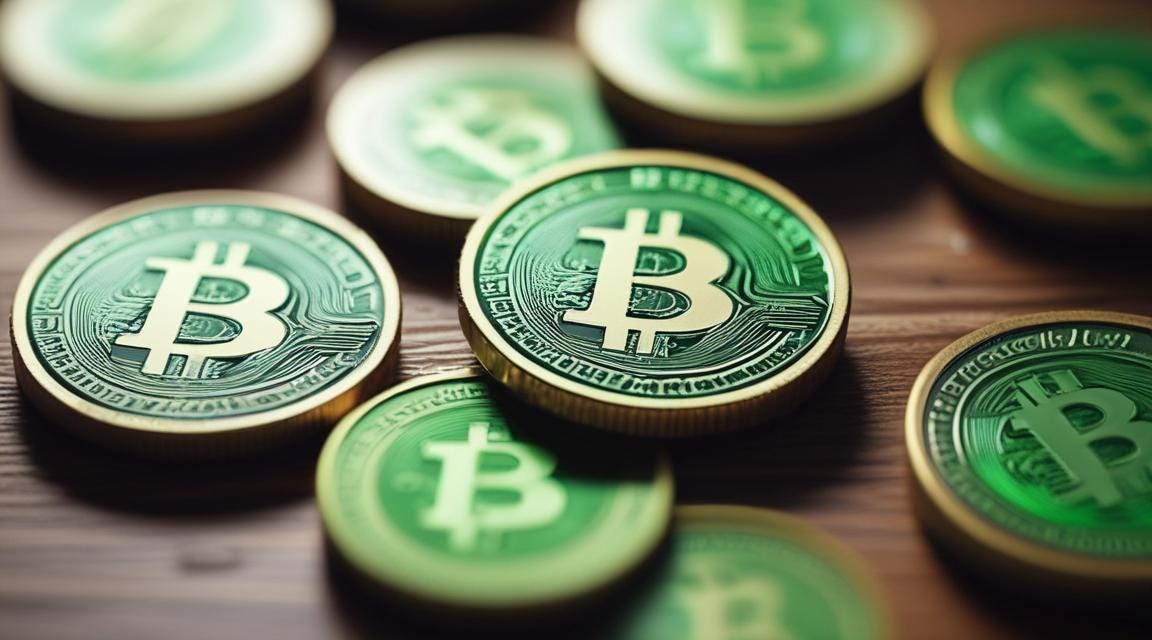Proof It Works
A poem and an essay on Bitcoin, its corruption, and its revival.
Your groceries did not go up in price; your corrupted fiat's value went down. The interest does not increase your savings when the notes they print flood every town. Your currency has no inherent worth for nothing is backing it with value. It's not "just lockdowns", it's not "just the war"; it's bankers making sure you have no clue. And if you thought this was bad, just you wait! For CBDCs have all the same faults. Only, they can be programmed to say "no" if you're taking too much out from the vaults. You think I'm having you on? Be wary of the "cash is king" tune we hear some hum. Plastic paper deceives you by saying: "I promise to pay the bearer this sum." So is there any real money out there? Something valuable and anonymous, that doesn't have a central bank barge in when we see through the lies and make a fuss? Gold and silver might work when in-person, barter falls within the same sort of form. Instant long-distance trade with pure money only works with a proof-of-work platform. Something with a fixed supply won't inflate. Something peer-to-peer is decentralised. Something with easy exchange has value. That something is Bitcoin, as first devised.
Proof It Works - A Poem by Tom Shaw
As someone interested in our inherent value as individuals, and how the value we bring to the world is acknowledged and reciprocated, the debate around the means of exchange and Bitcoin has long fascinated me. I’ve been wanting to give some thoughts on Bitcoin for a long time now, but in the past few weeks it seems to have finally come together, coinciding with a seeming upturn in the popularity of Bitcoin on social media. My good friend Lluvias Trozzi Newman has long been an advocate for its use, with his “What Is Bitcoin?” article being a fairly comprehensive read on the subject.
Reciprocity and barter-based systems work fine when there is an immediate, tangible need for both parties, or when it is hard to put a number on the value of someone’s offerings. The WWOOFing movement is a good example of this, where volunteers offer a few hours of labour a day on organic farms in return for food and board. This kind of transaction doesn’t need money, and the hours of labour can be adjusted based on the tasks required or the needs of both the host and the volunteer. I have friends who’ve agreed to be lifelong mentors for each other and their families, with services that would normally be charged for in money being given in exchange for the other’s expertise. That works, because it’s obvious what both parties need and they are personal services that are difficult to attach a price value to.
But there are times when a token to represent value is needed - such as a shopkeeper providing a good to a customer. The customer needs the item the shopkeeper is providing, but it’s not obvious that they have any immediate skills or tangible resources relevant to the shopkeeper. But, if the customer has a token demonstrating they have provided value to someone else in the community or society, that can be exchanged with the shopkeeper instead. That is what money is meant to be in my mind, and why even tribal and indigenous cultures have developed their own forms of money, often in the form of shells that could be turned into jewellery that acted as a medium of exchange.
To me, Bitcoin is simply a tool for representing the value of an exchange of goods or services - or what money should be. I’m not a “worshipper” of Bitcoin, just as I am not a “worshipper” of a hammer or a plough. But, in my time researching and trying to understand both conceptually and technically how Bitcoin works, I feel comfortable saying it offers a better solution to exchanging value than pretty much every fiat currency - or, currencies recognised by and controlled by nation states. That doesn’t mean it has to be the only tool we use, and I am still believe there are good use cases for bartering/reciprocal agreements and even bullion (gold, silver etc). We don’t have to be locked to one tool - but it just so happens that Bitcoin seems to be a pretty good one for allowing long-distance, decentralised means of exchange.
Amongst the circles that I see advocating for “freedom” and “sovereignty”, I see some criticisms and fearmongering around Bitcoin that I’ve never quite been able to get on-board with. I haven’t quite worked out a clean way to put it all in a poem, so I’m going to tackle some of my thoughts on these criticisms for the remainder of this piece as a more conventional essay. Then, at the end I’ll have an announcement that you’ll want to stick around for.
Is Cash Really King?
Note: For the purposes of this essay, “cash” refers to as physical forms of fiat currencies (i.e. coins and banknotes).
In a ways, I can understand the latching on to cash as a means of fighting the increasing push towards total state control over personal finances. Cash might be able to hold off the introduction of a CBDC in the short-term, and not having 2.5% of each transaction taken away by SWIFT gives it a strength over conventional card payments, but it’s impossible that it can win out in the long-term.
This is because, fundamentally, the bank notes and coins that we use still have their value tied to a centrally-controlled currency - one which, for most Western countries, is not backed by any tangible asset. Central banks can print new money at will and dilute the value of our cash over time. And part of why we’ve found ourselves in the situation we’re in is that the currency itself is intrinsically flawed.
Bitcoin is NOT the same as a CBDC, and it is fundamentally incorrect to compare it to such to make the case that cash is better. CBDC’s rely - by definition - on having a central bank issue the currency and control every transaction with it. Bitcoin is deliberately designed to be the opposite - there is no bank that creates new Bitcoin, there is no bank that payments go through, nobody can come in and prevent a transaction from happening between the sender and the receiver once they’ve agreed.
The “Power Outage” Scenario
A common attack that Bitcoin critics like to employ is that of the power or internet outage, whether from solar flare or tyrannical government, arguing that Bitcoin becomes either inaccessible or worthless in such a scenario.
If we’re at the point where internet and power are no longer available, I think there will be much, much bigger things to worry about than how much of whatever money we hold. We’re not going to be wanting to keep hold of our cash if this happens - we’re going to want to get food, water, medicines and shelter - and keep it secure.
Sure, within a collapsed society, all stores of wealth - including gold and Bitcoin - become essentially undesirable and worthless… unless someone plans on making their way to another, more stable country. They might be in with a shock if they try to use their local fiat currency, though, as I can’t see many people wanting to buy a collapsed currency with no worth in such a stage. They’d have a far better time with either bullion or Bitcoin in such a scenario, which can exist independently of a state’s operations.
Speed, Efficiency and Value
So, with the arguments against cash laid out, let’s turn our attention to gold, silver and other precious resources. For in-person trades in off-grid places with no access to internet or power? Sure, why not. But want to make a long-distance trade, or for a digital service? Try shipping gold halfway around the world and see how well that goes. Not only is it going to be a slow and laborious process, but we have to trust that everyone handling that gold en-route to its final recipient is going to handle that bullion appropriately.
Bitcoin’s design means that there is no third-party who can steal some Bitcoin if they wanted to during that process. We may rely on a network of interconnected servers to process that transaction, but those devices can’t actually take any of the Bitcoin for themselves (minus a pre-agreed transaction fee). It goes through without anybody asking who the people are or why they’re transferring money between each other - including any government or any bank. Bitcoin offers a way of keeping the benefits that a digital means of payment can provide while eliminating the risk of interference by malicious actors, whether on a currency or on a technical level.
There are some other design features that make Bitcoin interesting too, such as having a fixed limit of 21 million coins, meaning it can never be subject to inflationary measures which dilute its value. Bitcoin’s only purpose is to be money, unlike gold and silver which have uses outside of just being money that can distort its value as a means of exchange. As a result, the value of Bitcoin is backed by the electricity put into the system to generate new Bitcoin or to facilitate exchange. If people want to use it and host servers to allow its use - which they do - then it will be valuable.
But… BTC is Not Bitcoin
Note: The original version of this piece stated that the 1MB limit was introduced at Bitcoin’s release. This was not actually the case, and was retroactively implemented 18 months after release. The article has been corrected to reflect this.
All of this makes it sound like I have no issues with Bitcoin at all and that I should be some prophet and devotee. However, what most people think of as “Bitcoin” - the BTC token - is not actually what Bitcoin was intended to be. And this is where I may disagree with Lluvias Trozzi Newman.
The whitepaper detailing the specifications for Bitcoin specifically states it was designed to be a peer-to-peer cash system. In its early days, the data size of the “blocks” in which transaction data was transferred in was limited to 1MB. This was fine when very few people used it, but it was always intended by the creator to be a temporary limit. Now, with so many people trying to trade with it, the cost and time of each transaction has spiked. This prevents it from being used as a practical exchange medium as originally intended, and “solutions” like SegWit and Lightning have to fundamentally compromise some of the security that made the original Blockchain system so desirable. JeffreyTucker of the Brownstone Institute - an early adopter of Bitcoin and now notable Covid dissident - made this exact point in a recent article of his, and I highly encourage you give it a read below.
There is also the excellent “Who Killed Bitcoin?” documentary, which you can watch for free below:
There was a solution proposed that would have maintained the ease and low cost of transactions without needing to do cheap technical tricks or second-layer solutions that sacrificed what made the original tech so desirable from a security and peer-to-peer standpoint: increase the block size. This would allow more transactions to happen per second and allow the network to scale appropriately to bring new people on-board.
What followed was a messy fallout and fracturing of the Bitcoin community. Advocates of increasing the block size were censored online and were largely cast out of the Bitcoin circles by maximalists who saw opportunity to keep the access to Bitcoin scarce and thus increase the value of their own supply, as Roger Ver describes in his book “Hijacking Bitcoin”. As the Covid era has taught me, when people with demonstrably good morals, principles and history get censored, there is good cause to pay attention.
There was the argument that by increasing the block size, more powerful tech and better internet is needed for the computers that are keeping the system going, which may lock out poorer people or those in developing nations who can’t get access to that tech and thus make it less decentralised. But, with how high transaction fees have been soaring with BTC, and how it increasingly only makes sense to use on-chain transactions for exorbitantly large sums of BTC, people from poorer backgrounds are being locked out anyways or have to rely on less-than-ideal solutions like Lightning. They’d do far better being able to save what they would have spent on such transaction fees and investing it in better tech and internet to run a higher-blocksize Bitcoin, in my view. And, on the basis there aren’t corrupting influences affecting people’s access to goods, technology should become cheaper in time with manufacturing and technical breakthroughs (sort of like Moore’s Law, although I don’t think that the rate of technological advancement is constant).
As I was finalising this piece, I discovered Bitcoin Cash Podcast have an article on this piece which came to a similar conclusion I did on the blocksize/centralisation issue for those wanting to explore this issue more:
A New Use For Bitcoin
A slightly higher-blocksize Bitcoin than BTC does, however, exist: Bitcoin Cash (BCH). This is a duplicate of the Bitcoin code created in 2017 specifically to increase the block size in-keeping with people’s access to technology, and to keep Bitcoin in-line with the original whitepaper vision. I’ve found the Bitcoin Cash Podcast to be an excellent source of information regarding this, and they have their own excellent write-up on Bitcoin and Bitcoin Cash which you can read using the button below:
They’re also lining up increasingly interesting guests, including notable CBDC critics Aaron Day and Resist CBDC, as well as great dives into the pitfalls of BTC.
BCH represents a clear improvement over BTC practically, technically, and in its adherence to the key principles of Bitcoin. With all that in mind, I’m very excited to announce that I’ve now set up automated BCH payments on my store. That means you can pay for my prints, books and workshops directly in Bitcoin. I even offer the opportunity for you to pay for a paid Substack subscription through my store with Bitcoin.
There’s something really exciting about being able to trade-in that digital currency for a tangible physical item. If that doesn’t make Bitcoin real, I don’t know what does. If you’ve been looking for a way to support my work to allow me to keep creating the pieces I do - without using fiat currency - I’d be honoured. Use the button below to take a look:
And if you’re still critical of Bitcoin, there will still be the option to pay in conventional fiat currencies too.
I have also set up a general donation system using BCH too if you’re not interested in picking up anything physical but still want to give me a helping hand. You can scan the wallet address below, or use the wallet address in the caption to send some BCH to me that way. For those who haven’t done this before, using a wallet with a built-in P2P exchange like Zapit, although closed-source, is probably a good way to start.
If you’d like to share this poem with others on social media or privately, feel free to use the image version below:
It is also available as a print from my Shop - which you can buy using Bitcoin Cash! Use the button below to take you there:
Thank you for taking the time to read this piece. I hope it inspired something in you.
With gratitude,
Tom













Fun read bro! Don't expect it to go unanswered though ;)
Crypto is a scam devised by the ultra-rich. It relies on new suckers to keep it going. I have a friend that is worth millions in Bitcoin. He has profited from it too. But tell me something, if everybody that "owns" it wants to "cash" it in at the same time, what will its "value" be? Zero. So, show me your crypto, but not on a screen. Bet you can't.